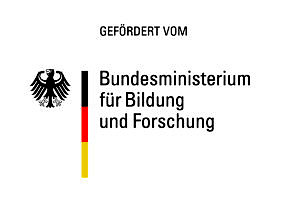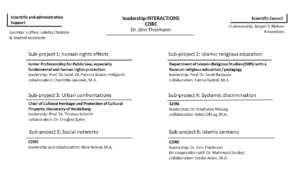INTERACTIONS
Interactions of Islamist radicalisation considered in a social and political context: human rights effects, Islamic religious education, urban space, systemic discrimination, social networks and sermons
INTERACTIONS
Interactions of Islamist radicalisation considered in a social and political context: human rights effects, Islamic religious education, urban space, systemic discrimination, social networks and sermons
How do Muslims perceive the changes (politics, discourses, practices) triggered by Islamistic radicalisation? How do they react, internally and externally? What are topics of discussions in Muslim milieus? What is taught? What is preached?
Even if appraisals circulate in the public sphere, there is hardly any empirically confirmed, scientific knowledge about it. Our project WECHSELWIRKUNGEN ( = interactions), funded by the Federal Ministry of Education and Research, analyses the interactions between politics, society, and Muslim citizens in Germany. This project is the first to consistently focus on Muslim perspectives on Islamist radicalisation.

Project leader: Dr. Jörn Thielmann
Funding: BMBF ( = Ministry of Education and Research)
Duration: 4 years (1. September 2020 – 31. August 2024)
Project partners: Erlangen Centre for Islam and Law in Europe (EZIRE), Department of Islamic-Religious Studies (DIRS), Institute of Geography, Junior Professorship for Public Law, especially fundamental and human rights protection / Centre for Human Rights Erlangen-Nürnberg (CHREN)
Cooperation partners: Central Institute for Regional Research (FAU), Max-Plank-Institute for Anthropological Research, Halle
In six interlinked sub-projects we address the interactions between actors from politics, society and Muslim communities that have been triggered by Islamist radicalisation or that arise from political, legislative, police, judicial, and social response to it. In doing so, we consistently analyse the previously neglected Muslim perspective in externally induced effects (sub-projects 1 – 4) and on those that arise from within the Muslim communities themselves (sub-projects 5 and 6): How do Muslims perceive the changes (political, discursive, in practices) triggered by Islamist radicalisation? How do they react, both internally and externally?
The research gaps identified during the project will be filled on the basis of empirical, qualitative, and quantitative social science research as well as by hermeneutical methods and legal comparison. Our approach to this is transdisciplinary. This means that we transfer our scientific findings systematically and methodically to the non-scientific public. In dialogue with the public we are able to identify new problems and generate questions.
The empirically based understanding of the interactions investigated by us will enable political actors, administration, safety, legal authorities and the civil society to take accurate and appropriate measures so that the Muslim communities as self-evident partners are fully involved to ensure the effectivness and sustainability of the measures taken.
